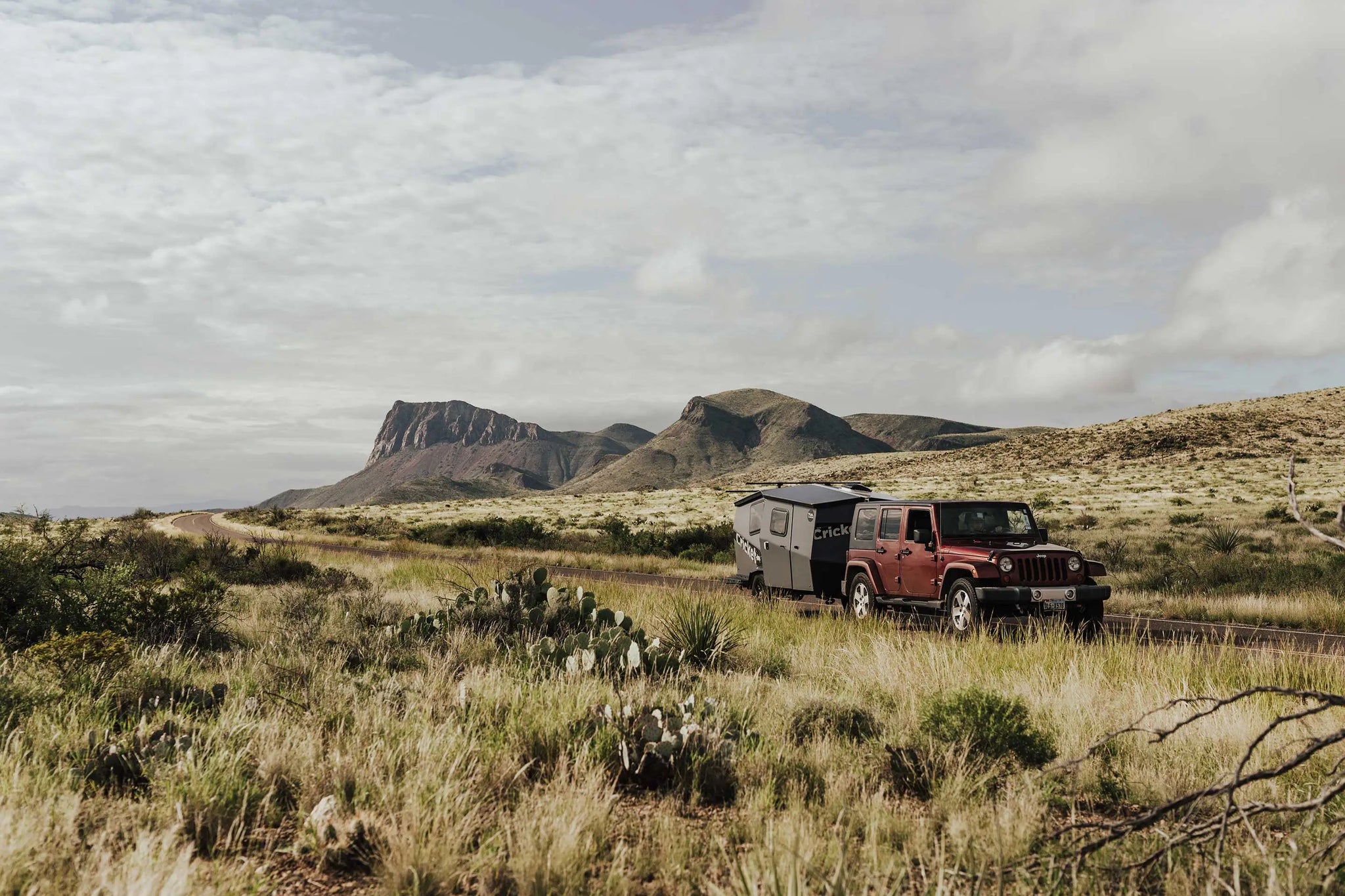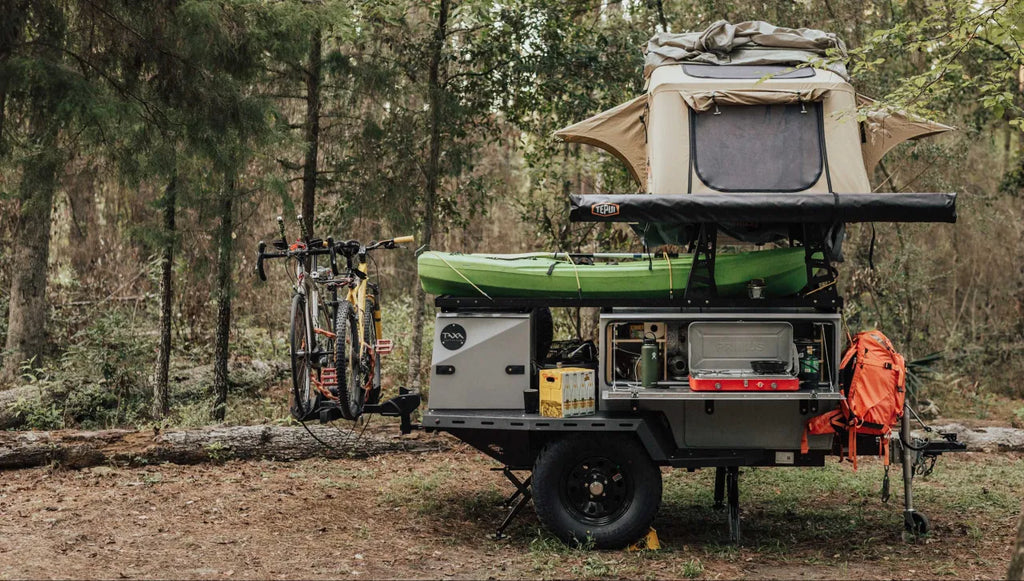Camping Trailer vs. Travel Trailer: Understanding the Differences
By TAXA Habitat Specialists \

While some might call this a game of semantics, comparing the camping trailer and travel trailer categories might provide clarity when selecting a vehicle for your next adventure. The differences are subtle — but they do exist.
First, what is a trailer (vs. a motorhome)?
Before we look at the more specific differences between different types of trailers, what actually defines a trailer? The generally-accepted criteria for this is that they aren’t powered by an engine and aren’t self-propelled (and therefore “trail” a tow vehicle). This is different from motorhomes and RVs, which do have engines and can be driven on their own. However, trailers often have much more flexibility and can be more cost-efficient, which has resulted in a boom in popularity.
Camper vs. travel trailer
When we look at the trailer category, there are two primary terms you’ll see: Camping trailers (campers) and travel trailers. Engineers craft camping trailers specifically for the camping experience. Many trailers, regardless of naming specifics, possess the capability to drive on rough terrain, withstand harsh elements, and store belongings in tight spaces. However, camping trailers are uniquely crafted to excel at these tasks and are kings of efficiency and practicality. Many call camping trailers “adventure vehicles,” or as we at TAXA like to say, mobile human habitats purposefully designed to inspire the journey towards and into nature. These trailers engage with the natural world instead of running from it.
On the other hand, travel trailers are built with comfort and often luxury in mind. However, many require external hookups for things like water and electricity, as they’re expected to be used at established campsites with these in place. They are typically larger, with more amenities that lend themselves to someone living within the trailer for extended periods. This is in contrast to campers, where lots of time is spent outside and the trailer is primarily used for sleeping and eating, rather than the majority of your time.
Some would say there is some crossover territory between camping and travel trailers. However, in general, the intention of a travel trailer is to provide a living space that more closely resembles what you probably have back home. Rather than being immersed in the wild, the travel trailer serves up modern living in a mobile environment.
Feature differences
Camping Trailers: Typically smaller and lighter than travel trailers, campers also usually possess a more rugged build for camping terrain and adventures (such as overlanding). These trailers embrace the fact that many people camping may not have access to civilization (at least as they know it) while using them. Consequently, engineers design most camping trailers with solutions for electricity, water, and storage for days on end. In essence, camping trailers provide the necessities, oftentimes elegantly, but do not burden campers with luxury.
Travel Trailers: Rather than durability or efficiency, travel trailers pride themselves on convenience. Most require an RV hookup and take up more space than a camping trailer. Of course, these differences usually mean a more robust power system, more storage, and larger bedrooms. Many also possess well-equipped kitchens, living areas, and bathrooms. All of this extra space and comfort does come with an increased price tag, however.

Other comparisons & differences
Travel trailers and campers aren’t the only types of similar vehicles that get confused. With all the slight variations and different names, it can be difficult to keep everything straight, so we’ve summarized a few more common comparisons below:
5th wheel vs. travel trailer
5th wheels are often a similar size to travel trailers (larger than campers and other smaller trailers), but the primary difference between these is in how they connect to the tow vehicle. Travel trailers connect via a bumper-level hitch, while 5th wheels connect to a hitch that is inside the bed of a truck. This means that 5th wheels can also only be towed by a pickup truck, not other vehicles that most other trailer categories can use.
Pop-up vs. travel trailer
On the other side of the spectrum from these larger trailers and RVs, pop-up campers are typically the smallest category of trailers. They have designs that collapse and “pop up” for storage and use. This means they can be towed by a wider variety of vehicles, but also have less storage and living space (unless you have a hybrid pop-up camper like our Mantis and Cricket habitats).
Toy hauler vs. travel trailer
As the name implies, a toy hauler’s primary purpose is to store and transport things like motorcycles, ATVs, jet skis, and more. While some have living space and amenities like a small kitchen, this is secondary to the function of storage. Because they can come in a wide range of shapes and sizes, this purpose is what sets them apart from travel trailers and campers.

Finding the perfect trailer for your adventures
To summarize, travel trailers insulate campers from the wild while camping trailers immerse them in it. Neither choice is right or wrong — however, comparing these two might shed some light on how each category fits what you’re looking for in your next vehicle.
At TAXA Outdoors, we provide adventure vehicles specifically for those wanting to journey into the outdoors. Our trailers can be important tools that enable survival and enjoyment while keeping the focus of your journey outwards.
Whether you’re looking to rent for a week or purchase for the long haul, TAXA Outdoors partners with an extensive network of high-quality dealers across the country. To connect with a dealer that can help find the perfect vehicle for you, use our Find a Dealer tool. Or, to find the right TAXA habitat for your journey, talk to one of our specialists who can point you in the right direction.

